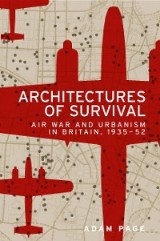Details

Architectures of survival
Air war and urbanism in Britain, 1935-52|
129,99 € |
|
| Verlag: | Manchester University Press |
| Format: | EPUB |
| Veröffentl.: | 02.01.2019 |
| ISBN/EAN: | 9781526122605 |
| Sprache: | englisch |
| Anzahl Seiten: | 240 |
DRM-geschütztes eBook, Sie benötigen z.B. Adobe Digital Editions und eine Adobe ID zum Lesen.
Beschreibungen
<i>Architectures of survival </i>is an original and innovative work of history that investigates the relationship between air war and urbanism in modern Britain. It asks how the development of airpower and the targeting of cities influenced perceptions of urban spaces and visions of urban futures from the interwar period into the Cold War, highlighting the importance of war and the anticipation of war in modern urban history. Airpower created a permanent threat to cities and civilians, and this book considers how architects, planners and government officials reframed bombing as an ongoing urban problem, rather than one contingent to a particular conflict. It draws on archival material from local and national government, architectural and town planning journals and cultural texts, to demonstrate how cities were recast as targets, and planning for defence and planning for development became increasingly entangled.
Architectures of survival investigates how airpower influenced urbanism and debates about the future of cities in modern Britain. It traces the targeting of cities and militarisation of urban space from interwar to Cold War and highlights how air raids became incorporated into civilian planning debates about cities and infrastructure.
Introduction
1 In the next war: the future of cities and the future of war
2 Planning a ‘militant peace’: air raid precautions for peace and for war
3 Cities under fire: the ‘new blitz reality’
4 Seeing cities through bombsights: urban geographies of war after 1945
5 A peace that is no peace: reconstruction, defence and development in town and country
Conclusion: the ordinariness of air raids?
Index
1 In the next war: the future of cities and the future of war
2 Planning a ‘militant peace’: air raid precautions for peace and for war
3 Cities under fire: the ‘new blitz reality’
4 Seeing cities through bombsights: urban geographies of war after 1945
5 A peace that is no peace: reconstruction, defence and development in town and country
Conclusion: the ordinariness of air raids?
Index
Adam Page is Lecturer in History at the University of Lincoln
<i>Architectures of survival in</i>vestigates the relationship between air war and urbanism in modern Britain. It asks how the development of airpower and the targeting of cities influenced perceptions of urban spaces and visions of urban futures. An original and innovative work of history, this book brings together a diverse range of source material to highlight the connections between practices of warfare and urbanism in the twentieth century.
Moving from the interwar period to the Cold War, this book demonstrates how airpower created a permanent threat to cities. It considers how architects, planners and government officials reframed bombing as an ongoing urban problem, rather than one contingent to a particular conflict, and details how the constant threat of air raids prompted planning for defence and planning for development to become increasingly entangled. It highlights the importance of war and the anticipation of war in modern urban history, and argues that the designation of the city as a target has had long-lasting consequences. Page draws on archival material from local and national government, architectural and town planning journals, and cultural texts, to demonstrate how air war became incorporated into civilian debates about the future of cities and infrastructure, and vulnerability to air raids was projected onto the mundane material culture of everyday urban life.
This book will be of particular interest to urban historians, social, cultural and political historians of modern Britain, urban sociologists, architects and planners. It will also interest historians of the Second World War and the Cold War.
Moving from the interwar period to the Cold War, this book demonstrates how airpower created a permanent threat to cities. It considers how architects, planners and government officials reframed bombing as an ongoing urban problem, rather than one contingent to a particular conflict, and details how the constant threat of air raids prompted planning for defence and planning for development to become increasingly entangled. It highlights the importance of war and the anticipation of war in modern urban history, and argues that the designation of the city as a target has had long-lasting consequences. Page draws on archival material from local and national government, architectural and town planning journals, and cultural texts, to demonstrate how air war became incorporated into civilian debates about the future of cities and infrastructure, and vulnerability to air raids was projected onto the mundane material culture of everyday urban life.
This book will be of particular interest to urban historians, social, cultural and political historians of modern Britain, urban sociologists, architects and planners. It will also interest historians of the Second World War and the Cold War.
Diese Produkte könnten Sie auch interessieren:

Der Deutsch - Französische Krieg 1870 / 71: Die Gründung des Deutschen Reiches

von: Rainer Smolcic

4,99 €















